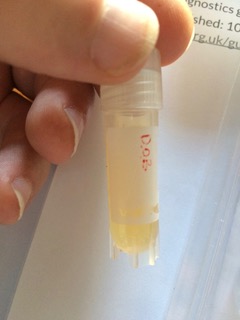PART 5: How Sheila’s Oncologist Explained His Over-Dosing at Our Next Meeting
Simply put: he couldn’t, or more accurately, wouldn’t. He had my letter with him, with the lab report stapled to the back of it.
He said he hadn’t carried out the test so he wasn’t able to recognise it and even if he did recognise it, it didn’t fit in with what he was allowed to do; it didn’t fit his “pathway”, he said. OMG, I thought - that was the whole point of getting the test done ourselves; he had already refused to do it and here we are offering him direct proof that he was mis-dosing my wife that he didn’t normally have and he was refusing to even recognise it, let alone act upon it! I thought the top of my head was about to come off!
 |
| Let me at him! |
As I opened my mouth to give him the benefit of my thoughts, he held up his hand and said “there are, of course, a number of other reasons I could use to reduce the dose”.
At that point, I thought I should shut up and listen.
He said that if Sheila’s side effects were bad enough, he could reduce the dose, or even give her a treatment break. Sheila and I looked at each other and then together, at him. We all knew what he was saying, without saying it. He had his way out.
He asked Sheila how bad her fatigue was and she said, bad. I expanded on that, telling him that she slept all the time, I hardly ever saw her anymore and even a short trip to the supermarket required a sleep after it. He asked her how bad her neuropathy was and she said it was taking longer and longer to disappear. He said that either of these reasons in itself, would be good enough reason to reduce her dose by 10% or even 20% (our test result showed he was over-dosing her by 33%, which is into the toxic range).
Thanks to the help we had from Saladax and the test result we had, we were able to demonstrate to Sheila’s oncologist how he was just guessing at the right dose of 5-FU for her and getting it wrong by relying only on his BSA calculation. Without our result, he would never have known any of that. However, with that result, we were able to put him right on the spot and he had to find a way out of a tricky situation without recognising our result directly, but honestly, is that really any way to carry on?
Not everyone has gone as far as we have to get the knowledge and comfort we sought from our cancer centre but didn't get. In fact, I'm wondering if anyone at all has; I haven't found any similar stories out there, so if anyone reading this does have a similar story to ours, please let me know.
From my research, I have become quite sure that today, millions of people with cancer around the world who, like Sheila, are unknowingly, being given the wrong dose of chemotherapy because oncologists rely only on an extremely outdated BSA calculation and they are unwilling to change their entrenched ways. A large proportion of people are under-dosed, and sometimes they are over-dosed, like Sheila. Only about 20% of people get the right dose and that’s just unacceptable, plain and simple.
Anyway, back to the story. Before considering reducing the dose of 5-FU in future, Sheila's oncologist wanted to deal with the Oxaliplatin because it was exacerbating her side effects. At this time, Sheila had had 6 doses of that and he suggested stopping it and then seeing how Sheila would cope with his calculated dose of 5-FU by itself.
Now, there are two schools of thought on whether six cycles of Oxaliplatin are enough or whether you need up to eight to be fully effective. My view is very much on the fence over that; there seems to be an equal amount of evidence on both sides of the argument, so I was relaxed about that, but Sheila wanted to try for more, which her oncologist agreed to do for up to another two doses as long as we understood the risks of permanent neuropathy and that he reduced the dose by 20%, so okay then. Sheila has a steely edge to her sometimes and a quiet determination that I admire in her.
So, Sheila and I left that meeting knowing that all we had to do next time was lay it on thick that her side effects were so bad that a dose reduction was required and because we and her oncologist now understood each other, he would reduce her dose in future.



Comments
Post a Comment